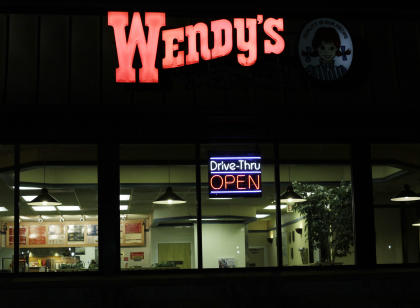Fast-Food Chains Cut Worker Hours, Blame Obamacare
Count Wendy’s (WEN) as the latest fast-food restaurant to respond to Obamacare with a reduction in worker hours. Following some other chains that have made headlines recently, a Wendy’s franchise owner in Omaha, Neb., told about 100 workers in the area that their hours would be cut in anticipation of mandates in the Affordable Care Act (ACA).


According to a local TV station, the store said that employees in non-management positions will have their hours reduced to 28 a week. A spokesman blamed the cuts on the new law that, beginning in 2014, will require employers to offer health coverage to employees who log at least 30 hours a week, or pay a penalty starting at $2,000 per worker. The Wendy’s spokesman said, as a small-business owner, he can't afford to stay in operation and pay for everyone's health insurance. Under the law, any company that has more than 50 full-time workers falls under the new health insurance mandate.
According to a report from an Oklahoma station on Monday, a Taco Bell (YUM) in Guthrie, Okla., adopted a similar policy.
And in October, Darden Restaurants (DRI), which owns Olive Garden and Red Lobster, said it has stopped offering full-time schedules to many hourly workers in at least a few of its restaurants in an “experiment aimed at keeping down the cost of health care reform.” Soon after the company said it would back off somewhat from its plan, presumably and at least in part because of the negative reaction following the announcement.
Higher prices to come?
According to a recent survey from consulting company Mercer, 51% of employers who do not currently provide health coverage to employees working 30 or more hours a week indicated they’d change their workforce strategy so fewer workers will be eligible.
More important for consumers is that many companies are likely to pass on to them the higher health-care costs associated with Obamacare. “Ultimately, consumers may see higher prices for some goods and services,” says Tracy Watts, national health care reform leader at Mercer.
Restaurant chains tend to be fairly low-margin businesses. “They can’t really absorb the change without either taking costs out of their operations somewhere or passing costs onto consumers," says Helen Friedman, director of workforce analytics and planning practice at Towers Watson, a consulting firm. "You just don’t have a lot of options.”
And company analysts are assuming costs will rise and thus are baking those expectations into their forecasting models. “I do expect to see overall health care costs go up for most quick-service restaurants, even though they’re looking for ways to offset the costs,” says RJ Hottovy, a Morningstar analyst who covers several casual dining chains, including McDonald’s (MCD), Darden and Yum Brands (YUM).
“I think some of these companies are going to face a significant cost burden and I would expect to see prices to go up generally for a lot of them,” Hottovy says.
Last year Papa John’s (PZZA) CEO John Schnatter said on a conference call that he estimates health reform requirements would “cost 11 to 14 cents per pizza, or 15 to 20 cents per order from a corporate basis.” In a follow-up op-ed in the Huffington Post, Shattner said that the company had no plans to “cut team hours as a result of the Affordable Care Act.” He also clarified comments he made to a reporter while visiting a Florida college, saying it was “common sense” for Papa John’s franchise owners to reduce workers’ hours so they wouldn’t be required to provide them with health insurance.
Anti-Obamacare comments by Schnatter and Zane Tankel, the CEO of Applebee’s franchisee Apple-Metro, put a dent in the public image of the companies, as measured by YouGov's Buzz Score, which measures the perception of what’s being said about the brand. (The class action lawsuit in November accusing Papa John's of sending unsolicited text messages to customers probably played a part, too.)
When it comes to Obamacare and other such issues, it's important for companies to consider the business consequences associated with their actions. “When you’re evaluating options, some of these employers are between a rock and a hard place," says Jane Jensen, senior consulting actuary at Towers Watson. "Our clients are looking to their corporate image. The viewpoint of their potential workforce and the viewpoint of their customer base all come into play.”
Clarification: This article was updated on Jan. 11. It misstated that Papa John’s CEO said he planned to raise prices of its pizza and cut jobs as a result of the health reform law.
